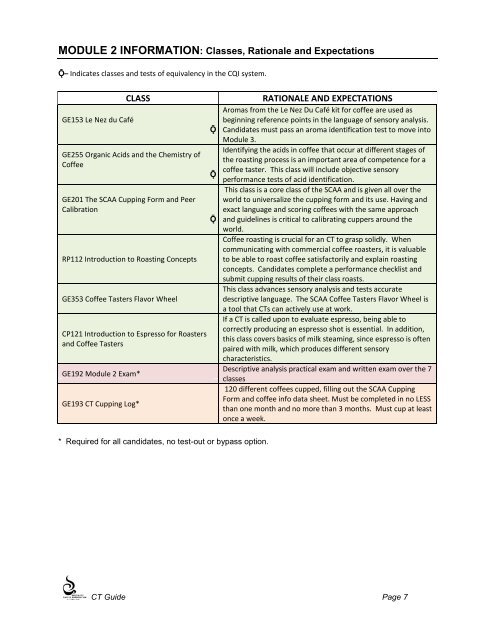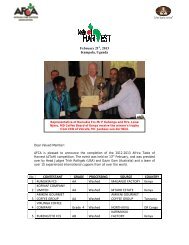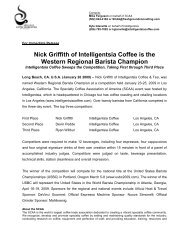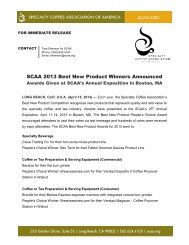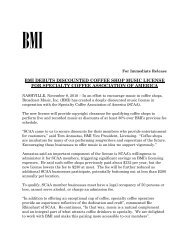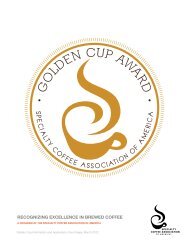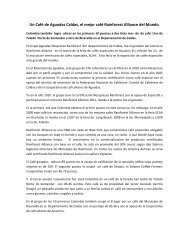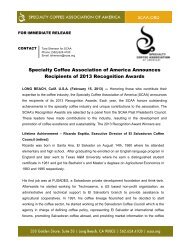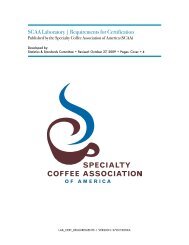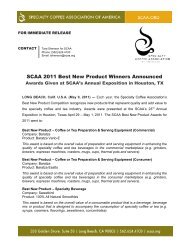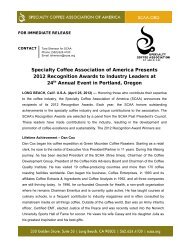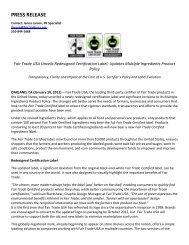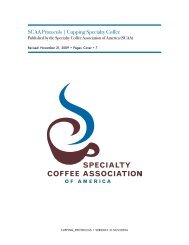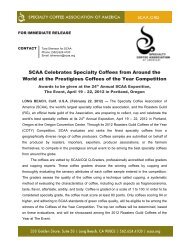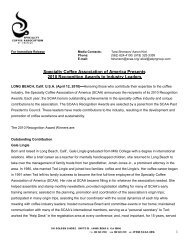Coffee Taster Certificate Program Handbook - SCAA
Coffee Taster Certificate Program Handbook - SCAA
Coffee Taster Certificate Program Handbook - SCAA
Create successful ePaper yourself
Turn your PDF publications into a flip-book with our unique Google optimized e-Paper software.
MODULE 2 INFORMATION: Classes, Rationale and Expectations<br />
Ǭ– Indicates classes and tests of equivalency in the CQI system.<br />
GE153 Le Nez du Café<br />
CLASS<br />
GE255 Organic Acids and the Chemistry of<br />
<strong>Coffee</strong><br />
GE201 The <strong>SCAA</strong> Cupping Form and Peer<br />
Calibration<br />
RP112 Introduction to Roasting Concepts<br />
GE353 <strong>Coffee</strong> <strong>Taster</strong>s Flavor Wheel<br />
CP121 Introduction to Espresso for Roasters<br />
and <strong>Coffee</strong> <strong>Taster</strong>s<br />
GE192 Module 2 Exam*<br />
GE193 CT Cupping Log*<br />
Ǭ<br />
Ǭ<br />
Ǭ<br />
RATIONALE AND EXPECTATIONS<br />
Aromas from the Le Nez Du Café kit for coffee are used as<br />
beginning reference points in the language of sensory analysis.<br />
Candidates must pass an aroma identification test to move into<br />
Module 3.<br />
Identifying the acids in coffee that occur at different stages of<br />
the roasting process is an important area of competence for a<br />
coffee taster. This class will include objective sensory<br />
performance tests of acid identification.<br />
This class is a core class of the <strong>SCAA</strong> and is given all over the<br />
world to universalize the cupping form and its use. Having and<br />
exact language and scoring coffees with the same approach<br />
and guidelines is critical to calibrating cuppers around the<br />
world.<br />
<strong>Coffee</strong> roasting is crucial for an CT to grasp solidly. When<br />
communicating with commercial coffee roasters, it is valuable<br />
to be able to roast coffee satisfactorily and explain roasting<br />
concepts. Candidates complete a performance checklist and<br />
submit cupping results of their class roasts.<br />
This class advances sensory analysis and tests accurate<br />
descriptive language. The <strong>SCAA</strong> <strong>Coffee</strong> <strong>Taster</strong>s Flavor Wheel is<br />
a tool that CTs can actively use at work.<br />
If a CT is called upon to evaluate espresso, being able to<br />
correctly producing an espresso shot is essential. In addition,<br />
this class covers basics of milk steaming, since espresso is often<br />
paired with milk, which produces different sensory<br />
characteristics.<br />
Descriptive analysis practical exam and written exam over the 7<br />
classes<br />
120 different coffees cupped, filling out the <strong>SCAA</strong> Cupping<br />
Form and coffee info data sheet. Must be completed in no LESS<br />
than one month and no more than 3 months. Must cup at least<br />
once a week.<br />
* Required for all candidates, no test-out or bypass option.<br />
CT Guide Page 7


